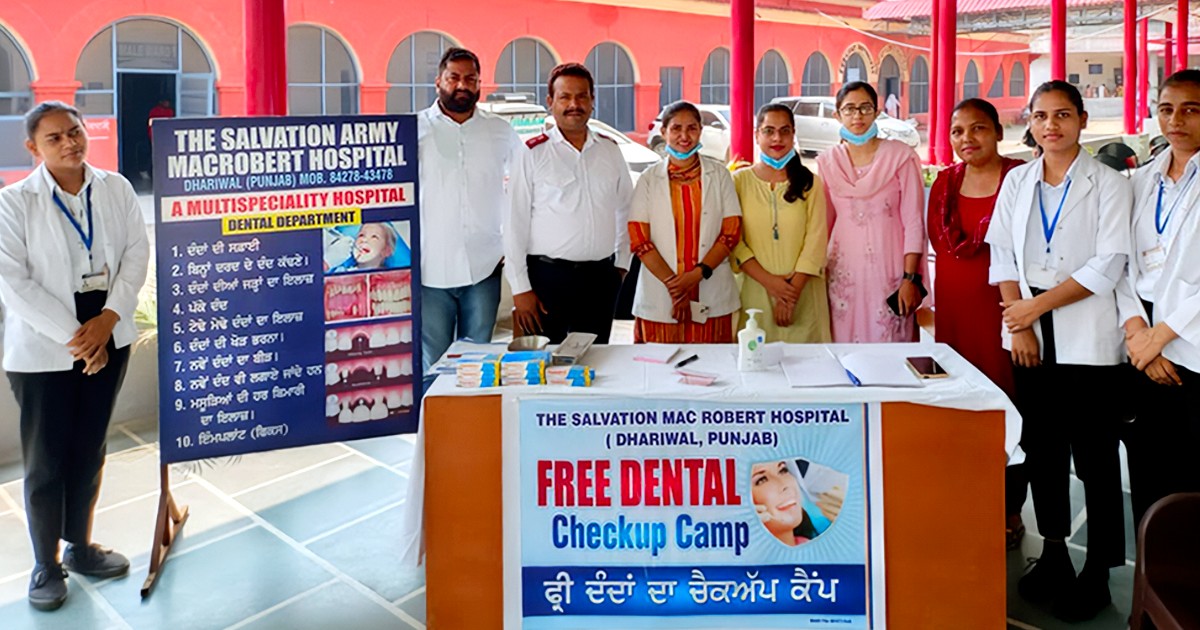
Yes, we should help everyone we can and remain flexible to meet needs as they arise.
BY MAJOR MIKE HOEFT
Every day, people walk through the doors of their local Salvation Army looking for help. From small towns to big cities the same story plays out—someone has a need and The Salvation Army figures out how to meet that need. We purchase bus tickets, arrange for accommodation, buy gas, distribute food from our pantry and provide services too numerous to mention. If you ask any Salvation Army officer or worker, they will recall many times when someone phoned or dropped in and said, “I don't know if you can help me, but I don't know where else to go.”
I am reminded of a phone call I received many years ago from the courthouse. A man had been arrested and was to appear in court but had no shoes. Normally this would not be a challenge, but the man had size-15 feet! I immediately thought of a very tall police officer I knew and wondered if he might have an extra pair of shoes. It turned out that he was a size 15 and was happy to give over a pair of his flippers.
One of the strengths of The Salvation Army is that we have flexibility in our structure and rules that allow us to think outside the box and help people in situations where other organizations may be stymied. It is this kind of pioneer, can-do thinking that led our Founder, William Booth, to look at the problems of 19th-century England and try everything from farm colonies to match factories to rescuing drunks on the streets of London (read In Darkest England and the Way Out). While other groups and governments might have been tempted to wring their hands and wonder, “What are we to do?”, William Booth and his fledgling Army decided they would try something—anything—to help anyone who was in need.
Since its inception, The Salvation Army has avoided being a “one-trick pony” and has stretched its limits and pushed the boundaries in pursuit of helping people who walk through our doors to the best of our ability. That stretching has brought us into health care, prison work, micro banks, emergency services, children's villages and much more. I believe that in the future with God's guidance, we will continue to diversify and respond as needs arise and as people present themselves.
At the risk of sounding too pious, God does this with each of us. He realizes that our path to him is fraught with perils and pitfalls and he tailors a plan just for us. The way he draws me to him is different than the way he draws someone else. In the same way, no two clients' needs are the same and neither is the solution. We should begin every conversation with the mindset of finding out who each person is and how we can cater to his or her particular need.
This approach is more difficult than focusing on a few key areas and it may be more difficult to brand. It takes more time, creativity and personal investment to arrive at a solution. But when people sit in our office or when we meet them on the street, they need to know that they are more than just a number. The Army has a plan that fits their unique needs—and so does God.
Major Mike Hoeft is the corps officer in a three-point charge in Northeast Saskatchewan and territorial rural ministry consultant.
No, we can't be experts in everything. But we can do a few things well.
BY CAPTAIN MARK STANLEY
“If you're going to do something, do it well.” This tenet was often repeated by my parents when I was growing up. Working in The Salvation Army for more than 20 years as an employee and officer, I have often encountered similar exhortations from past and present leaders. Today we are hearing these same high expectations from the public, donors, government and those the Army serves. “Doing it well” is an approach that is part of our Army DNA. This sound approach to service should motivate us to consistently and constantly adjust, improve and refine our methods.
From an operational and organizational perspective, the Army has been engaged in specialized ministries from its beginnings—whether it has been by intention or default. We are often the first and only organization to respond to a need in the community if for no other reason than because no one else is doing the work. The Army has always been drawn to areas of service and ministry where no one else is responding—working with new immigrants to Canada in the early 1900s, caring for expectant mothers through maternity homes, being Canada's first “recyclers” by starting thrift stores in 1908 or, in recent years, ministering to those trapped by human trafficking. Our study and application of Scripture, particularly the use of spiritual gifts (see 1 Corinthians 12:27-30), speaks very clearly to the notion of specialization for the benefit and edification of the church.
Today, the Army is facing new challenges in service provision. Social services in Canada are in the midst of a paradigm shift where serving the homeless, marginalized and addicted involves not only meeting an urgent need, but also working to eliminate the need entirely. Corps and social services units must meet increasing requirements for health and safety, employment standards, licensing and funder expectations. These requirements are specific and significant, and it is unrealistic to think that a generalist approach will suffice.
In Leadership Secrets of The Salvation Army, Commissioner Robert Watson writes, “When tradition-bound enterprises … are challenged by new conditions, their first tactic is often to put pressure on the old business model to be more productive. What the situation requires is an approach that's responsive and flexible enough to improvise on an individual level, yet deliberate and comprehensive enough to be broadly effective.” We need a new model.
The generalist approach can encourage unrealistic expectations from the organization and enable unhealthy behaviour in the individual. We have all experienced situations where a new officer or leader makes a final decision without seeking input from others or humbly acknowledging his or her limitations. Being responsible for specialized ministries and services does not make one an expert by default. We do not do well when we confuse authority with expertise.
The Army can respond to specific challenges and opportunities by ensuring its officers and employees receive the training they need when they need it. This includes working with all officers to identify vocational career paths, engaging in targeted recruiting for positions that require specific expertise and offering flexible officership training. The alternative is not something we can afford—less effective services and ministries, a frustrated workforce, the loss of credibility and emotionally distressed and burnt-out officers and employees.
The move out of some services may seem prudent and necessary. There was a time when the Army was the only provider of food to the hungry. Now, Food Banks Canada has taken over this service in most communities. Although the Army still plays an important role in the provision of emergency and disaster services, today it is another agency that has elevated its profile and presence in recent years so that the Army is not the “go-to” agency in times of crisis. If we withdraw services, we may reduce our exposure to risk and spread our resources less thinly, but there will be a cost—reduced community presence, diminished public awareness and decreased support, and fewer entry points into the community where Christ's love and his message can be shared. Is that a price we're willing to pay?
Captain Mark Stanley is the executive director of the Addictions and Residential Centre in Edmonton. In addition to 15 years of social services experience in Canada, he has also served in Bangladesh and Jamaica.
(Photo: © iStockphoto.com/retrorocket)










Leave a Comment